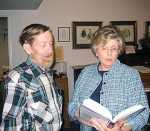Civil War general's biography will be topic at meeting

Professional author Robert Collins will discuss his latest book, "General James G. Blunt -- Tarnished Glory" at the Historical Society meeting held at 2 p.m., April 9, in the Bushwhacker Museum, 212 W. Walnut.
Collins lives in Andover, Kan., and has only recently turned his hand to biographies of historical people. His prior published works include more than 60 short science fiction stories.
"My writing started with an interest in 'Star Wars' and 'Star Trek,'" Collins said.
After that he decided to try his hand at going where almost every western-bound pioneer had gone before -- Kansas!
"I had written several books about Kansas railroads and related places to see," Collins said.
He had always had an interest in history, and wanted to expand his knowledge of Kansas during the "Bleeding Kansas" Civil War era.
"No one had done a biography of General Blunt before," Collins said. "He seemed interesting enough to sustain the book, and I found some interesting things about him that haven't appeared in other histories of the area that had mentioned General Blunt."
Much of his research was obtained through hours of searching microfilm records from early Kansas newspapers.
"General Blunt was Kansas' highest-ranking and most important Civil War general. He commanded troops in several battles in this region including Cane Hill, Prairie Grove, Honey Springs, Westport and the Second battle of Newtonia. It was his escorts that were killed at the Baxter Springs massacre," Collins explained.
"He was a good general, somewhat a talented amateur; but not a very pleasant person," he added.
"He couldn't get along with officers who disagreed with his abolitionist views. He was a bit corrupt and was a womanizer. He was of mixed character."
Pointing out General Blunt's sometimes difficult to see good qualities, Collins said, "He did his own scouting of the Confederate position in advance of his forces at Fort Wayne, October 1862." Collins chuckled and explained further.
"He supposedly 'liberated' a slave and asked him about the disposition of the Confederate troops. As it turned out, this liberated slave had belonged to one of the Confederate officers on the other side and gladly told General Blunt all he knew."
Collins laughed aloud and added a tale that put General Blunt back on the dark side. "After the Battle of Honey Springs in 1863 Blunt wrote letters to Secretary of War Edwin Danton and President Lincoln. He concluded each letter by implying that 'if all officers who are criticizing his behavior aren't court-martialed, he will resign his commission and challenge them all to duels.'" During the long months of research, Collins got to know the General more intimately than he would have liked if he were meeting him face to face.
"The thing I liked the least about General Blunt was he couldn't take criticism," Collins said.
"He was accused of corruption several times, and always responded that anyone who criticizes him is simply a traitor. I found that very troubling."
Collins continued, "If he were innocent he wouldn't have behaved that way. Although there was no concrete evidence that he was corrupt there was a pretty good circumstantial case to be made." Collins added, "His attitude affected his career. He got into so much trouble that for three months in 1864 he was symbolically demoted by being sent to Fort Larnard, Kan., to chase Cheyenne Indians."
One of Collins' other books is "The Race to Indian Territory," which details the race between competing Kansas railroad lines (the Missouri River-Fort Scott & Gulf, and the Leavenworth-Lawrence & Galveston) to reach the southern border of Kansas by 1869. The first there would get exclusive rights to build through the Indian Territory and enter Texas from the north.
Other historical books he has written are "Kansas Railroad Attractions" and "The Border Tier Road" which is a complete history of the Frisco Line railroad that came south out of Kansas City, through Fort Scott and Columbus. His railroad books can be found at www.SouthPlattePress.com and his biographies at www.Pelicanpub.com.
Collins has lots of plans for the future. "About two years ago I finished a book "Interesting and Important Things That Have Happened in Kansas" and I want to market that."
"Last fall I finished a biography of Jim Lane and that has been accepted by Pelican and will be out in the future," Collins said. "He was the leader of the free state movement during the Bleeding Kansas era and was one of Kansas‚ first two senators. Missouri history buffs might remember him and his Lane Brigade as the ones who participated in the burning of Osceola," Collins said.
"Now," he added, "I'm researching the historic competition between Kansas county seats. At least half of the 105 Kansas counties have had some sort of struggle over which town would become the county seat. I think those stories will be very interesting history."
At the Historical Society meeting, he will speak on General Blunt, take questions in an interactive presentation and conduct a book signing.
Terry Ramsey, Bushwhacker Museum coordinator, explained that having entertaining and educational speakers at the Historical Society meetings is beneficial in keeping members active and in drawing in new members. "Our society members don't come here for the business meetings, they come to hear the speakers," she explained.
Speakers are selected for their knowledge, availability and costs. "That is a big issue," Ramsey explained. "The meetings are always free to members and the public. Since they generate no income, we can't afford speakers that charge large speaking fees."
Suggested speakers can be recommended by calling the Museum at (417) 667-9602.
